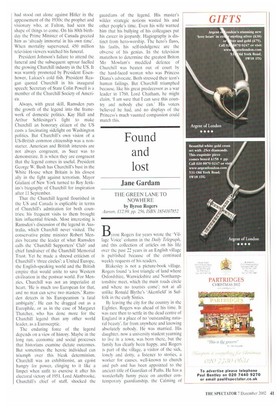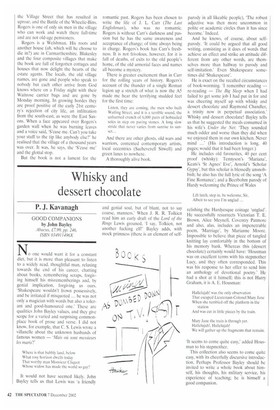Found and lost
Jane Gardam
THE GREEN LANE TO NOWHERE by Byron Rogers Aurrem, £12.99, pp. 256, ISBN 1854107852 Byron Rogers for years wrote the 'Village Voice' column in the Daily Telegraph, and this collection of articles on his life over the past 22 years in an English village is published because of the continued weekly requests of his readers.
I3lakesley is not a picture-book village. Rogers found 'a lost triangle of land where Oxfordshire, Warwickshire and Northamptonshire meet, which the main roads circle and where no tourists come; not at all unlike Ronald Blythe's `Akenfield' in Suffolk in the early Sixties.
By leaving the city for the country in the Eighties, Rogers was ahead of his time. It was rare then to settle in the dead centre of England in a place of no 'outstanding natural beauty', far from anywhere and knowing absolutely nobody. He was married. His daughter, now a university student yearning to live in a town, was born there, but the family has clearly been happy, and Rogers is part of the village, a visitor of the sick, lonely and dotty, a listener to stories, a worker for causes, well-known to church and pub and has been appointed to the ancient title of Guardian of Paths. He has a wonderfully funny piece on another contemporary guardianship, the Calming of
the Village Street that has resulted in uproar, and the Battle of the Wheelie-Bins. Rogers is one of only six men in the village who can work and watch there full-time and are not old-age pensioners.
Rogers is a Welshman. His roots and another house (ah, which will he choose to die in?) are in Carmarthenshire. Blakesley and the four composite villages that make the book are full of forgotten cottages and houses that now delight the hearts of the estate agents. The locals, the old village names, are gone and people who speak to nobody but each other arrive from God knows where on a Friday night with their Waitrose carrier bags and are gone by Monday morning. In growing hordes they are proof positive of the early 21st century's rejection of city life, an infiltration from the south-east, as were the East Saxons. When a face appeared over Rogers's garden wall when he was burning leaves and a voice said, `S'cuse me. Can't you take your stuff to the tip like anybody else?' he realised that the village of a thousand years was over. It was, he says, the `S'cuse me' and the glottal stop.
But the book is not a lament for the romantic past. Rogers has been chosen to write the life of J. L. Carr (The Last Englishman), who was no romantic. Rogers is without Carr's darkness and passion but he has the same awareness and acceptance of change; of time always being in charge. Rogers's book has Carr's freshness. It is not frivolous, however, for it is full of deaths, of exits to the old people's home, of the old armorial faces and names all become a mystery.
There is greater excitement than in Carr for the rolling years of history. Rogers's account of the thunder of a single Roman legion up a stretch of what is now the A5 made me hear the terrifying studded feet for the first time:
Listen, they are coming, the men who built Watling Street. and it is a terrible sound, the unhurried crunch of 6.000 pairs of hobnailed soles in step on paving stones. A long slow stride that never varies from sunrise to sunset...
And there are other ghosts, old wars and warriors, contented contemporary artists, local eccentrics (Sacheverell Sitwell) and green lanes to nowhere.
A thoroughly alive book. parody in all likeable people), 'The robust adjective was then more uncommon in polite or academic circles than it has since become.' Indeed.
And he knows, of course, about selfparody. 'It could be argued that all good writing, consisting as it does of words that achieve an effect and strike an attitude different from any other words, are themselves more than halfway to parody and self-imitation.' Even Shakespeare sometimes did 'Shakespeare'.
He is exact on the recalled circumstances of book-worming. 'I remember reading — re-reading — The Big Sleep when I had failed to get some job I had put in for and was cheering myself up with whisky and dessert chocolate and Raymond Chandler, a trinity now in perpetual association.' Whisky and dessert chocolate! Bayley tells us that he suggested the meals consumed in his wife's Under the Net: 'They sounded much odder and worse than they did when we enjoyed them in our own kitchen. Never mind ...' (His introduction is long, 40 pages; would that it had been longer.)
He includes old favourites, 40 per cent proof (whisky): Tennyson's 'Mariana', Keats's `St Agnes' Eve', Arnold's 'Scholar Gypsy', but this scholar is blessedly unsnobbish; he also has the full lyric of the song 'A Fine Romance'; and a Beerbohm parody of Hardy welcoming the Prince of Wales Lift latch, step in, be welcome, Sir, Albeit to see you I'm unglad











































































 Previous page
Previous page